
Sir Oswald Ernald Mosley, 6th Baronet was a British aristocrat and politician who, during the 1920s and 1930s, rose to fame when, having become disillusioned with mainstream politics, he turned to fascism. He was a member of parliament and later founded and led the British Union of Fascists (BUF).
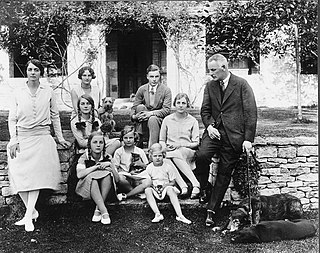
The Mitford family is an aristocratic English family, whose principal line had its seats at Mitford, Northumberland. Several heads of the family served as High Sheriff of Northumberland. A junior line, with seats at Newton Park, Northumberland, and Exbury House, Hampshire, descends via the historian William Mitford (1744–1827) and were twice elevated to the British peerage, in 1802 and 1902, under the title Baron Redesdale.
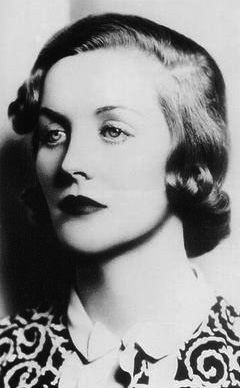
Diana, Lady Mosley, known as Diana Guinness between 1929 and 1936, was a British aristocrat, fascist, writer and editor. She was one of the Mitford sisters and the wife of Oswald Mosley, leader of the British Union of Fascists.

The British Union of Fascists (BUF) was a British fascist political party formed in 1932 by Oswald Mosley. Mosley changed its name to the British Union of Fascists and National Socialists in 1936 and, in 1937, to the British Union. In 1939, following the start of the Second World War, the party was proscribed by the British government and in 1940 it was disbanded.

Bryan Walter Guinness, 2nd Baron Moyne, was a British lawyer, poet, novelist and socialite. He was an heir to part of the Anglo-Irish Guinness family brewing fortune, and briefly married to Diana Mitford, one of the Mitford sisters.

Baron Moyne, of Bury St Edmunds in the County of Suffolk, is a title in the Peerage of the United Kingdom. It was created in 1932 for the Hon. Walter Guinness, a Conservative politician. A member of the prominent Guinness brewing family, he was the third son of the 1st Earl of Iveagh, who was himself the third son of Sir Benjamin Guinness, 1st Baronet, of Ashford.
The New Party was a political party briefly active in the United Kingdom in the early 1930s. It was formed by Sir Oswald Mosley, an MP who had belonged to both the Conservative and Labour parties, quitting Labour after its 1930 conference narrowly rejected his "Mosley Memorandum", a document he had written outlining how he would deal with the problem of unemployment.
Nicholas Mosley, 3rd Baron Ravensdale,, was a British peer, novelist and biographer, including that of his father, Sir Oswald Mosley, the founder of the British Union of Fascists.

Rotha Beryl Lintorn Lintorn-Orman was the founder of the British Fascisti, the first avowedly fascist movement to appear in British politics.
Thomas P. Moran was a leading member of the British Union of Fascists and a close associate of Oswald Mosley. Initially a miner, Moran later became a qualified engineer. He joined the Royal Air Force at 17 and later served in the Royal Naval Reserve as an engine room artificer.
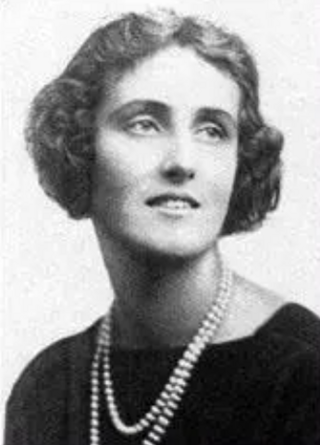
Lady Cynthia Blanche Mosley, nicknamed "Cimmie", was a British aristocrat, politician and the first wife of the British Fascist politician Sir Oswald Mosley.
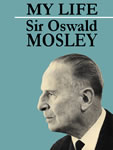
My Life is the autobiography of the British Fascist leader Sir Oswald Mosley. It was published in 1968.

Lady Alexandra Naldera Curzon, was a British aristocrat. She was the third daughter of George Curzon, 1st Marquess Curzon of Kedleston, Viceroy of India, and his first wife, the American mercantile heiress, Mary Victoria Leiter. She was named after her godmother, Queen Alexandra and her place of conception, Naldehra, India. She and her two older sisters were the subjects of a biography by Anne de Courcy in The Viceroy's Daughters: The Lives of the Curzon Sisters.
There have been three baronetcies created for members of the Mosley family, one in the Baronetage of England and two in the Baronetage of Great Britain. Only one creation is extant. Since 1980, the title has been held jointly with Baron Ravensdale in the Peerage of the United Kingdom.

David Bertram Ogilvy Freeman-Mitford, 2nd Baron Redesdale, was a British peer, soldier, and landowner. He was the father of the Mitford sisters, in whose various novels and memoirs he is depicted.
The European was a limited-circulation political and cultural magazine published between 1953 and 1959. It was edited by Diana Mosley of the Mitford family. As Diana Mitford, Mosley had been one of the bright young things and had cultivated friendships with several of the contributors to the magazine. These included Ezra Pound, Henry Williamson, and Roy Campbell. The magazine was published by Euphorion Books, a publishing company formed by Mosley and her husband, Sir Oswald Mosley, founder of the pre-war British Union of Fascists.

The Union Movement (UM) was a far-right political party founded in the United Kingdom by Oswald Mosley. Before the Second World War, Mosley's British Union of Fascists (BUF) had wanted to concentrate trade within the British Empire, but the Union Movement attempted to stress the importance of developing a European nationalism, rather than a narrower country-based nationalism. That has caused the UM to be characterised as an attempt by Mosley to start again in his political life by embracing more democratic and international policies than those with which he had previously been associated. The UM has been described as post-fascist by former members such as Robert Edwards, the founder of the pro-Mosley European Action, a British pressure group and monthly newspaper.

The British Fascists, formed in 1923, was the first political organisation in the United Kingdom to claim the label of fascist, although the group had little ideological unity apart from anti-socialism for much of its existence, and was strongly associated with conservatism. William Joyce, Neil Francis Hawkins, Maxwell Knight and Arnold Leese were amongst those to have passed through the movement as members and activists.
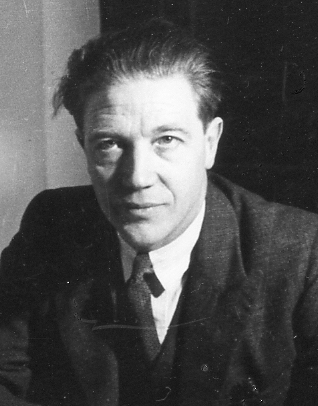
Wilfred Risdon was a British trade union organizer, a founder member of the British Union of Fascists and an antivivisection campaigner. His life and career encompassed coal mining, trade union work, First World War service with the Royal Army Medical Corps (RAMC), political and animal welfare activism.

Sir Oswald Mosley, 5th Baronet, was a British Army officer, aristocrat, amateur sportsman, and the father of Oswald Mosley, leader of the British Union of Fascists (BUF). His interests were in shooting, boxing, and motor-racing.















